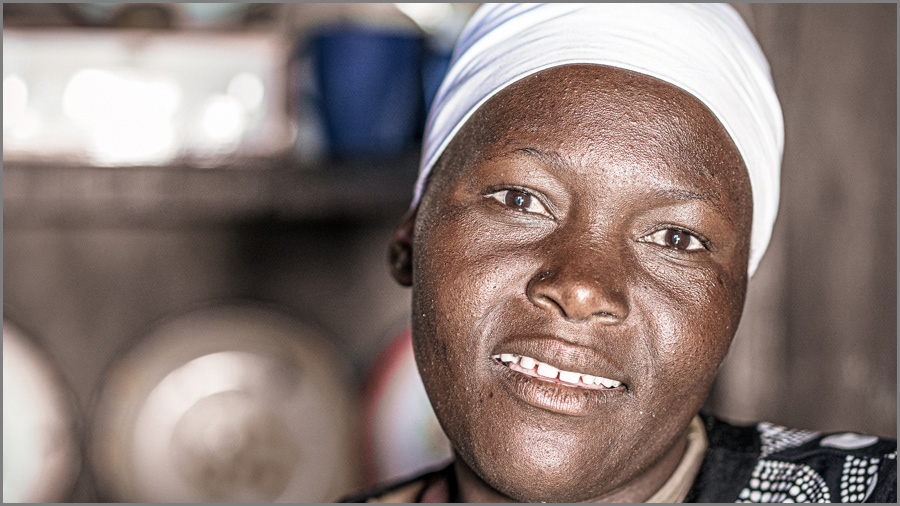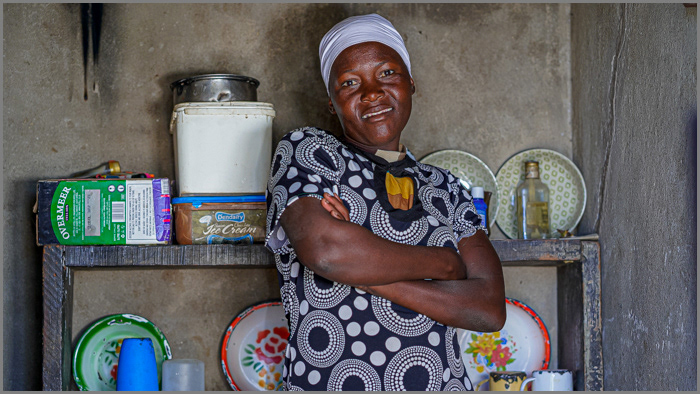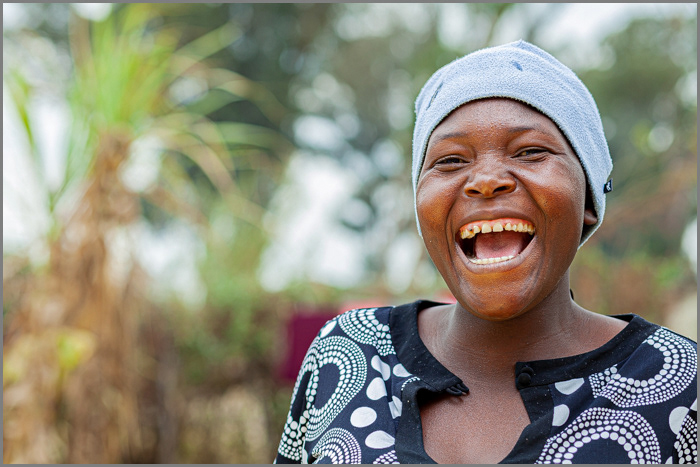Letwin Mubaiwa
At 27, Letwin Mubaiwa needs her husband’s assistance to communicate with her family or friends. Born into an underprivileged family, she cannot read or write, nor can she estimate her own age. Her parents barely made ends meet, and there wasn't enough food or clothing to cater for her and her siblings.
In 2012, aged 19, Letwin married Edmore Rwisai, "I thought that if I had my own family, I would have ample food to eat, enough clothes to wear, and be free to do what I wanted," she said. This did not happen. A seasonal general hand and security guard, Edmore does not earn enough to provide adequately for his wife and children. Before the COVID-19 lockdown, Letwin had a vending stall in Harare’s city center where she sold vegetables to supplement their household earnings. “Because of COVID-19, it’s hard for me to go into town and sell as I also have to worry about my children’s health.”
Letwin and Edmore have three daughters, Definite (9), Ruvarashe (3), and Apologise (2). Confined to their one-roomed house, Letwin cannot solicit advice from her peers on how to take care of her daughter, Definite, who has Cerebral Palsy (CP). The subject of constant ridicule, she carries Definite on her back as she attends to her daily household chores. Her fellow parishioners often tell her she is cursed to have a child ‘like that’, that her family needs to be cleansed and, sometimes, advised to abandon her child. Definite spends the most part of her day in a laundry dish whilst her sisters bat the flies off her face, "She can't sit, she can't speak, and she can't walk. I am her feet; I am her arms- I do everything for her," Letwin said. In a sense, the lockdown has been a reprieve from social commentators, and Letwin now has more time to spend with her family.
Every day, she wakes up at five o’clock in the morning and helps her husband prepare for work. The rest of the morning is dedicated to feeding, playing traditional games, and teaching her daughters how to perform household chores. Letwin spends the afternoon reflecting on her life and dancing. “I love to dance. I don’t need another person to validate the joy I find in myself or to help me celebrate. Just give me a bucket for a drum, and I will dance.”
As other families and entrepreneurs moved conversations from physical interactions to a digital environment, Letwin was unable to follow suit as her communications are closely monitored by her husband. She has a mobile network line in her name which her husband keeps in his wallet. Each alternate day, he switches his SIM card with hers to allow messages from her family and friends to come through. He reads them to her, responds to the messages, and reinserts his card. Letwin has no way of confirming that the correct messages have been sent.
In-between each wave of text messages, Letwin tends to her small vegetable garden. She fetches water from a borehole six kilometers into the next neighborhood and uses the water to irrigate her garden. The little garden has brought sustenance to her struggling family and with it, comes hope for her children, “I hope my children will find good men to marry them, better clothes to wear and enough food to eat. I want my daughters to take care of me when they are old enough to do so.”
NGANO
Letwin tells the story of Tsuro (rabbit) and Datya (frog), who lived at a time when humans and animals were a united community. Tsuro and Datya married two beautiful sisters and each went on to have a single child. aTezvara, their father-in-law, admired Datya for his stature and shiny skin. He didn’t like Tsuro as he had fur and always looked crusty. One day, both young men took their families to visit their in-laws. The parents were both surprised and happy to see their daughters and grandchildren. aTezvara took advantage of the visit and allotted sections of his farm to Tsuro and Datya that they might help him clear the land for plowing. Tsuro and his wife began to clear their section of the land whilst Datya rested under the shade of a tree. Around lunchtime, aTezvara and his wife brought food for their children. aTezvara found Tsuro and his wife hard at work with half the land cleared and rewarded them with lunch. On the other side of the land, aTezvara noticed it had not been cleared and found Datya sleeping under a tree near the river. He struck Datya with his walking stick and, ashamed, Datya hopped into the river and hid. This is how Datya came to live in the water; he is hiding from aTezvara, his father-in-law.
LESSON
The ongoing COVID-19 induced environment has highlighted a need to be inclusive of the needs of people with disabilities and their caregivers- to not choose between one or the other rather, to consider both, equally. The measures put in place have shown a preference for making it possible for able-bodied people to easily adjust. In the first days, there was no acknowledgment of the needs of people with disabilities and how they would access essential services. For example, some people with visual impairments do not have access to assistive devices and rely on family members or strangers to hold their hands and guide them. This would defeat the social distancing aspect of preventing transmission of COVID-19.



[Whispering Silence] This project was made possible with support from Africalia and the Directorate-General for Development Cooperation of Belgium.